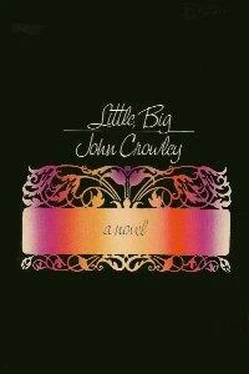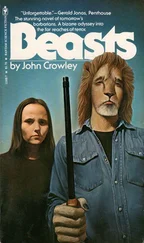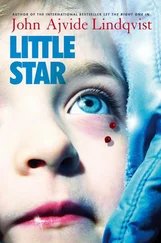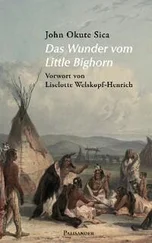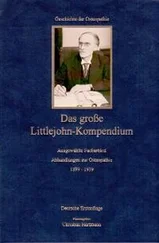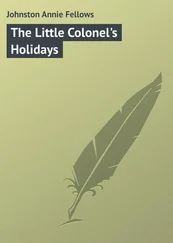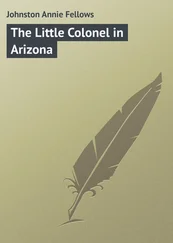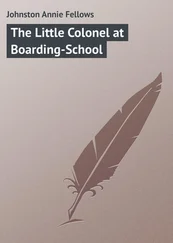Alone together at noon they ate peanut-butter and apple sandwiches in the walled garden at the back front of the house.
“The back front?”
Opulent trees looked over the gray garden wall, like calm spectators leaning on their elbows. The stone table they sat at, in a corner beneath a spreading beech, was marked with the coiled stains left by caterpillars crushed in other summers; their cheerful paper plates lay on its thickness flimsy and ephemeral. Smoky struggled to clear his palate; he didn’t usually eat peanut-butter.
“This used to be the front,” Daily Alice said. “Then they built the garden and the wall; so the back became the front. It was a front anyway. And now this is the back front.” She straddled the bench, and picked up a twig, at the same time drawing out with her pinkie a glittering hair that had blown between her lips. She scratched a quick five-pointed star in the dirt. Smoky looked at it, and at the tautness of her jeans. “That’s not really it,” she said, looking birdwise at her star, “but sort of. See, it’s a house all fronts. It was built to be a sample. My great-grandfather? Who I wrote you about? He built this house to be a sample, so people could come and look at it, from any side, and choose which kind of house they wanted; that’s why the inside is so crazy. It’s so many houses, sort of put inside each other or across each other, with their fronts sticking out.”
“What?” He had been watching her talk, not listening; she saw it in his face and laughed. “Look. See?” she said. He looked where she pointed, along the back front. It was a severe, classical facade softened by ivy, its gray stone stained as though by dark tears; tall, arched windows; symmetrical detail he recognized as the classical Orders; rustications, columns, plinths. Someone was looking out one tall window with an air of melancholy. “Now come on.” She took a big bite (big teeth) and led him by the hand along that front, and as they passed, it seemed to fold like scenery; what had looked flat became out-thrust; what stuck out folded in; pillars turned pilasters and disappeared. Like one of those ripply pictures children play with, where a face turns from grim to grin as you move it, the back front altered, and when they reached the opposite wall and turned to look back, the house had become cheerful and mock-Tudor, with deep curling eaves and clustered chimneys like comic hats. One of the broad casement windows (a stained piece or two glittered among the leaded panes) opened on the second floor, and Sophie looked out, waving. “Smoky,” she called, “when you’ve finished your lunch, you’re to go talk to Daddy in the library.” She stayed in the window, arms folded and resting on the sill, looking down at him smiling, as though pleased to have brought this news.
“Oh, aha,” Smoky called up nonchalantly. He walked back to the stone table, the house translating itself back into Latin beside him. Daily Alice was eating his sandwich. “What am I going to say to him?” She shrugged, mouth full. “What if he asks me what are your prospects, young man?” She laughed, covering her mouth, the way she had in George Mouse’s library. “Well, I can’t just tell him I read the telephone book.” The immensity of what he was about to embark on, and Doctor Drinkwater’s obvious responsibility to impress it on him, settled on his shoulders like birds. He wavered suddenly, doubted doubts. He looked at his big beloved. What anyway were his prospects? Could he explain to the Doctor that his daughter had cured Smoky’s anonymity as if in one blow—one glancing blow—and that that was enough? That the marriage service once completed (and whatever religious commitments they would like him to make made) he intended to just live happily ever after, like other folks?
She had taken out a little jackknife and was peeling a green apple in one segmented curling ribbon. She had such talents. What good was he to her?
“Do you like children?” she asked, without taking her eyes from her apple.
It was dim in the library, according to the old philosophy of keeping a house shut up on hot summer days to keep it cool. It was cool. Dr. Drinkwater wasn’t there. Through the draped, arched windows he could just glimpse Daily Alice and Sophie talking at the stone table in the garden, and he felt like a boy kept indoors, bad or sickly. He yawned nervously, and looked over nearby titles; it didn’t appear that anyone had taken a book from these laden shelves in a long time. There were sets of sermons, volumes of George MacDonald, Andrew Jackson Davis, Swedenborg. There were a couple of yards of the Doctor’s children’s stories, pretty, shoddily bound, with repetitious titles. Some nicely bound classics propped against an anonymous laureled bust. He took down Suetonius, and brought down with it a pamphlet that had been wedged between the volumes. It was old, both dog-eared and foxed, illustrated with pearly photogravure, and titled Upstate Houses and Their Histories . He turned its pages carefully so as not to break the old glue of the binding, looking at dim gardens of black flowers, a roofless castle built on a river island by a thread magnate, a house made of beer vats.
He looked up, turning the page. Daily Alice and Sophie were gone; a paper plate leapt from the table and spun balletically to the ground.
And here was a photograph of two people sitting at a stone table, having tea. There was a man who looked like the poet Yeats, in a pale summer suit and spotted tie, his hair full and white, his eyes obscured by the sunlight glinting from his spectacles; and a younger woman in a wide white hat, her dark features shaded by the hat and blurred perhaps by a sudden movement. Behind them was part of this house Smoky sat in, and beside them, reaching up a tiny hand to the woman, who perhaps saw it and moved to take it and then again perhaps not (it was hard to tell), was a figure, personage, a little creature about a foot high in a conical hat and pointed shoes. His broad inhuman features seemed blurred too by sudden movement, and he appeared to hear a pair of gauzy insect wings. The caption read “John Drinkwater and Mrs. Drinkwater (Violet Bramble;) elf. Edgewood, 1912.” Below the picture, the author had this to say:
“Oddest of the turn-of-the-century folly houses may be John Drinkwater’s Edgewood , although not strictly conceived as a folly at all. Its history must begin with the first publication of Drinkwater’s Architecture of Country Houses in 1880. This charming and influential compendium of Victorian domestic architecture made the young Drinkwater’s name, and he later became a partner in the famed landscape-architecture team of Mouse, Stone. In 1894 Drinkwater designed Edgewood as a kind of compound illustration of the plates of his famous book, thus making it several different houses of different sizes and styles collapsed together and quite literally impossible to describe. That it presents an aspect (or aspects) of logic and order is a credit to Drinkwater’s (already waning) powers. In 1897 Drinkwater married Violet Bramble, a young Englishwoman, daughter of the mystic preacher Theodore Burne Bramble, and in the course of his marriage, came completely under the influence of his wife, a magnetic spiritualist. Her thought informs later editions of Architecture of Country Houses , into which he interpolated larger and larger amounts of theosophist or idealist philosophy without however removing any of the original material. The sixth and last edition (1910) had to be printed privately, since commercial publishers were no longer willing to undertake it, and it still contains all the plates of the 1880 edition.
“The Drinkwaters assembled around them in those years a group of like-thinking people including artists, aesthetes, and world-weary sensitives. From the beginning the cult had an Anglophile twist, and interested correspondents included the poet Yeats, J. M. Barrie, several well-known illustrators, and the sort of ‘poetic’ personality that was allowed to flourish in that happy twilight before the Great War, and that has disappeared in the harsh light of the present day.
Читать дальше
